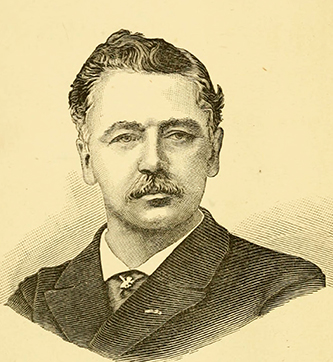22 Jan. 1828–16 Sept. 1893

Edward Warren, physician and surgeon, the son of Dr. William C. and Harriet J. Alexander Warren, was born in Tyrrell County, but both of his parents were of prominent Virginia families. His father was a physician who practiced in Edenton. After attending the local school, Edward Warren, at fifteen, went to a boarding school in Fairfax, Va. He graduated from the medical department of the University of Virginia in 1850 and received an M.D. degree from Jefferson Medical College in 1851. Warren practiced with his father until 1854, when he went to Paris for further study. While there he acted as correspondent for the American Journal of Medical Sciences. He had several noted teachers and made a special friend of Jean Martin Charcot, who years later helped him to begin a practice in Paris.
Warren returned to Edenton in the summer of 1855 and resumed his practice with his father. In 1856, for an essay on "The Influence of Pregnancy on the Development of Tuberculosis," he won the Fisk Fund prize, given by the Rhode Island Medical Society, which later published his essay. In 1857 he became editor of the Medical Journal of North Carolina, the first issue of which was published in August 1858; its last issue appeared in September 1861. Also in 1857 he married Elizabeth Cotten Johnston of Edenton. In 1860, partly because of the fact that his wife suffered from malaria, he accepted an offer to become professor of materia medica and therapeutics at the University of Maryland in Baltimore. With the outbreak of war in 1861 he returned to the South and held several important positions in the medical service of the Confederacy. Among these were chief surgeon of the navy of North Carolina, medical director of the Department of the Cape Fear, chief medical inspector of the Department of Northern Virginia, and surgeon general of North Carolina.
In 1865, after the war, Warren went back to Baltimore. As his former position at the University of Maryland was not available, he joined with some other physicians in reorganizing the old Washington University Medical School, whose charter was renewed in 1868. The school reopened, but in 1871 he and several other faculty members withdrew because of differences of opinion in regard to management. He then helped to develop the College of Physicians and Surgeons, which later absorbed the older Washington University school.
In 1875 Warren accepted service with the khedive and moved to Egypt, where he was appointed chief surgeon of the General Staff. He performed a successful operation, removal of a tumor and relief of an inguinal hernia, on Kassim Pasha, the minister of war, whom Egyptian surgeons had been unable to treat. Because of this he was given the honorary or courtesy title of "Bey" by the khedive and became so well known that he immediately had a large practice. However, he remained in Egypt less than two years, as he developed ophthalmia and went to Paris for treatment. His physician there advised against returning to Egypt. His excellent reputation, together with the help of Charcot and other friends, enabled him to shortly establish a practice in Paris, where he remained until his death. His wife, who was much younger than he, died in 1879 when she was six months pregnant. Warren was survived by two daughters. His two sons had died in infancy.
Edward Warren became a licentiate of the University of France and received many other honors. Among them, he was made a Knight of the Order of Isabella the Catholic by the Spanish government, was awarded the Cross of the Legion of Honor by France, and held the honorary LL.D. degree from the University of North Carolina (1884). He was one of the first to use a form of hypodermic medication, and he invented a splint for treatment of fracture of the clavicle.
In 1854, when Warren was twenty-six and just beginning his medical career, he contributed six poems to an anthology, Wood-Notes; or, Carolina Carols: A Collection of North Carolina Poetry, compiled by Mary Bayard Clarke. "The Rule of Life," An Address Delivered Before the Two Literary Societies of Wake Forest College, June 8, 1859 appeared in 1859 and his Introductory Lecture Delivered in the University of Maryland . . . October 15, 1860 in 1860. In 1863, in the midst of the Civil War, his 401-page An Epitome of Practical Surgery for Field and Hospital was published in Richmond. After the war, when he had returned to Maryland, his Introductory Lecture, Delivered Before the Faculty and Class of the Medical Department of Washington University . . . October 1, 1867 was also brought out. A volume of 613 pages, A Doctor's Experiences in Three Continents: In a Series of Letters Addressed to John Norris, M.D., of Baltimore, Md., appeared in 1885.